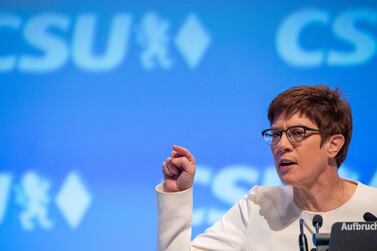Right-wing parties in Germany and Italy have won gains in regional elections making inroads at the expense of the two countries' centrist ruling coalitions.
In Germany, voters in the eastern state of Thuringia propelled the Alternative for Germany party (AfD) into second place with 23.4 per cent of the vote, placing the populist, right-wing party ahead of German Chancellor Angela Merkel’s ruling Christian Democratic Union of Germany party (CDU).
The Left party, Germany’s democratic socialist party, has retained its dominance in the former East German state but the disruptive gains by the AfD have made its path to coalition government unclear.
In Italy, right-wing leader Matteo Salvini’s League party, in coalition of the centre-right Forza Italia and the far-right Brothers of Italy, delivered a net victory in the Italian region of Umbria.
Senator Donatella Tesei was elected governor of the tiny central region with 56.5 per cent to 60.5 per cent of the vote, according to an exit poll for national broadcaster RAI.
The result has been viewed as a resounding defeat for the country’s ruling coalition in Rome. Vincenzo Bianconi, leader of a civic alliance backed by the populist Five Star Movement and the centre-left Democratic Party, won just 35.5 percent to 39.5 per cent of the vote.
Francesco Galietti, chief executive of political risk consultancy Policy Sonar in Rome, told The National Salvini’s victory was a “landslide”.
“Salvini has regained momentum — lots of it — and fissures within the government are playing into his hands,” Mr Galietti explained.







